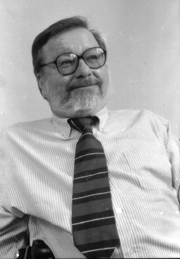4 Why Should We Design for Accessibility
Please view the video titled “Keeping Web Accessibility In Mind”
Transcript for Keeping Web Accessibility In Mind.
As teachers and members of an academic institution, don’t we want everyone to have the opportunity to learn, share, be creative and succeed in life? Aren’t we here to enrich people’s lives and provide information to everyone? Imagine if we can open doors to information, not shut them to a certain segment of the population. We want to enable independence for people with disabilities.
To quote David Berman, a web accessibility expert, “what if we had denied an education to these people?”

Ron Mace is known as the father of universal design. He became an architect and worked on the first U.S. building codes to incorporate principles of accessible design, in North Carolina in 1973. In college, he was carried into buildings that had no wheelchair ramps.
 Stephen Hawking is a famous mathematician and physicist, teaching at Cambridge University. He wrote “A Short History of the Universe” and served as the prestigious Lucasian Professor of Mathematics at Cambridge.
Stephen Hawking is a famous mathematician and physicist, teaching at Cambridge University. He wrote “A Short History of the Universe” and served as the prestigious Lucasian Professor of Mathematics at Cambridge.

Helen Keller was the first blind and deaf person to receive a Bachelor of Arts degree. She became a lecturer, writer, and political activist.
If you’ve ever experienced being excluded from an activity you wanted to participate in, you’ll understand, that designing inclusive experiences is the right thing to do.
It’s smart for business, helping users find our information and broadening our customer base.
Moreover, it’s the law.
For another perspective on designing for accessibility, view David Berman’s video titled “Why Should We Care.”

